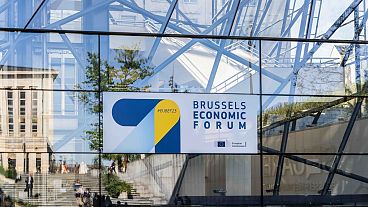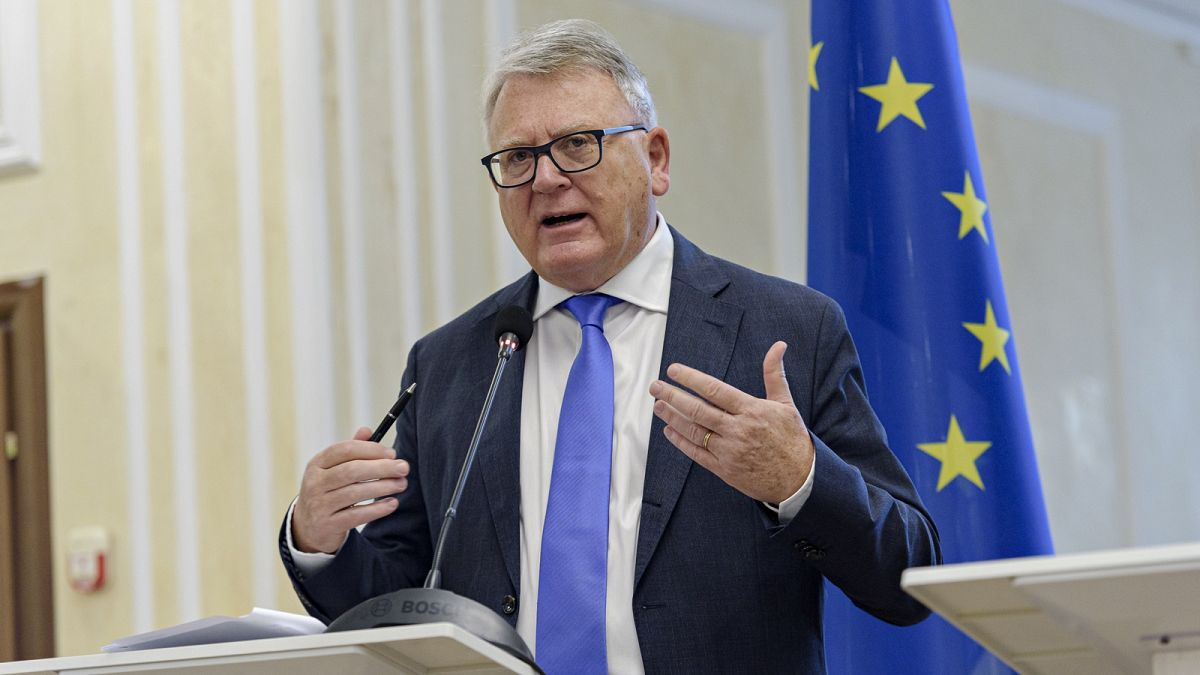The multi-million deals that Brussels has signed with neighbouring countries to decrease irregular migration have to be "revised," says Nicolas Schmit, the lead candidate of the European socialists for the June elections.
"I'm quite reluctant with these deals which have to still to prove efficient. We're spending now huge amounts of money, giving this money to different regimes or governments like the Tunisian government. We know the authorities there are really treating very badly the refugees," Schmit told Euronews in an exclusive interview filmed on Tuesday morning.
"We still have the problem in Lybia, where there (are) two governments. We have the question in Egypt. So I'm quite reluctant with this kind of deals," he went on.
"I think we have to revise them and see what can be done, how can we do it differently because we do not know exactly how the money is used."
With the statement, Schmit, the current European Commissioner for Jobs and Social Rights, openly breaks ranks with his boss, President Ursula von der Leyen, who over the past year has promoted the policy of signing agreements with neighbouring countries, such as Tunisia, Mauritania and Egypt, in a bid to boost their fragile economies and decrease the departure of irregular arrivals.
The strategy, which foresees millions in EU funds and investment projects for the recipient nations, enjoys ample backing across the board, including from Italy's Giorgia Meloni, Greece's Kyriakos Mitsotakis, Belgium's Alexander De Croo and Spain's Pedro Sánchez, all of whom have, at one point, joined von der Leyen on her official trips.
But these deals, often referred to as "memorandums of understanding," have been heavily criticised by humanitarian NGOs and migration scholars, who argue they are badly designed, lack transparency and rely on a vote of confidence on autocratic governments. Widespread reports of human rights violations in Tunisia and Egypt have cast a long shadow over their ethical legitimacy.
The latest chapter in this policy is Lebanon, where last week von der Leyen announced a €1-billion assistance package to relieve the crisis-stricken country's financial woes and prevent a surge of refugees heading towards Cyprus. The envelope, made entirely of grants, will be gradually rolled out until 2027.
"I've heard now that there has been a deal with Lebanon to keep the Syrians away from Europe, where nobody knows exactly how the money which has been announced will be spent in Lebanon, given the situation of the Lebanon government, which is, in some way, a very weak government," Schmit said.
During his interview with Euronews, the 70-year-old Luxembourg native lambasted the so-called "Rwanda model," which the United Kingdom has established to fly migrants to the African country and process their asylum claims onsite. Crucially, if the claims are approved, the refugees will be granted asylum in Rwanda, rather than on UK soil.
In its manifesto, the centre-right European People's Party (EPP) floats a vague project similar to the "Rwanda model" to partially outsource the processing of applications. Von der Leyen, the EPP's lead candidate, has denied the comparison and insisted any plan would be compatible with international law.
"I am absolutely against what we call the 'Rwanda model.' This is against the basic rights and fundamental rights Europe is built on," Schmit said. "Just delegating the treatment of refugees to Rwanda or whoever is a question of non-respect of human dignity."
'No way' to work with ECR
Given their common workplace – the European Commission – but opposing political affiliation, Schmit and von der Leyen find themselves in a peculiar position as they campaign as the Spitzenkandidaten of the PES and the EPP, respectively.
Von der Leyen, though, is the indisputable frontrunner thanks to her strong connections with EU leaders and the favourable polling of her party, widely expected to remain the largest force in the European Parliament after the June elections.
But in recent weeks, von der Leyen has raised eyebrows for her overtures to the hard-right European Conservatives and Reformists group (ECR), which encompasses the likes of Fratelli d'Italia (Italy), Law and Justice (Poland), Vox (Spain), New Flemish Alliance (Belgium), Civic Democratic Party (Czech Republic) and Sweden Democrats (Sweden).
The ECR is projected to see a significant boost in representation after June, possibly becoming the third-largest group, which will give their Eurosceptic, anti-Green Deal platform a bigger say in decision-making.
If reappointed by leaders, von der Leyen will need to be confirmed by an absolute majority in the Parliament, a tricky exercise considering the shifting arithmetic. Socialists have warned that if von der Leyen seeks votes from ECR, she will lose their backing.
"There is no way – I'm very clear on that – there's no way to have any arrangement, deal or whatever with the extreme right," Schmit told Euronews.
Schmit denounced the EPP for making what he called a "very special distinction" between the "decent" extreme right and the "pariah" extreme right and warned against the unpredictable consequences of this increasingly blurred line, arguing the ECR defended a "fundamentally different" conception of Europe.
"When I look at the so-called 'decent' extreme right, who are these people? They are Vox. They are Franco admirers. They are Mussolini admirers. They are the PiS party (Law and Justice) who (sic) was about to abolish the rule of law in Poland and was sanctioned by the Commission. So where is the decent extreme right? There is none," he said.
"That's why there is no way to have any arrangement just buying votes. Because the extreme right – they are intelligent. So they will not give their votes for nothing. They will ask (for) concessions on the way how European policy will be defined."
This interview is part of an ongoing series with all the Spitzenkandidaten. The full interview with Nicolas Schmit will air on Euronews over the weekend of 17 May.


